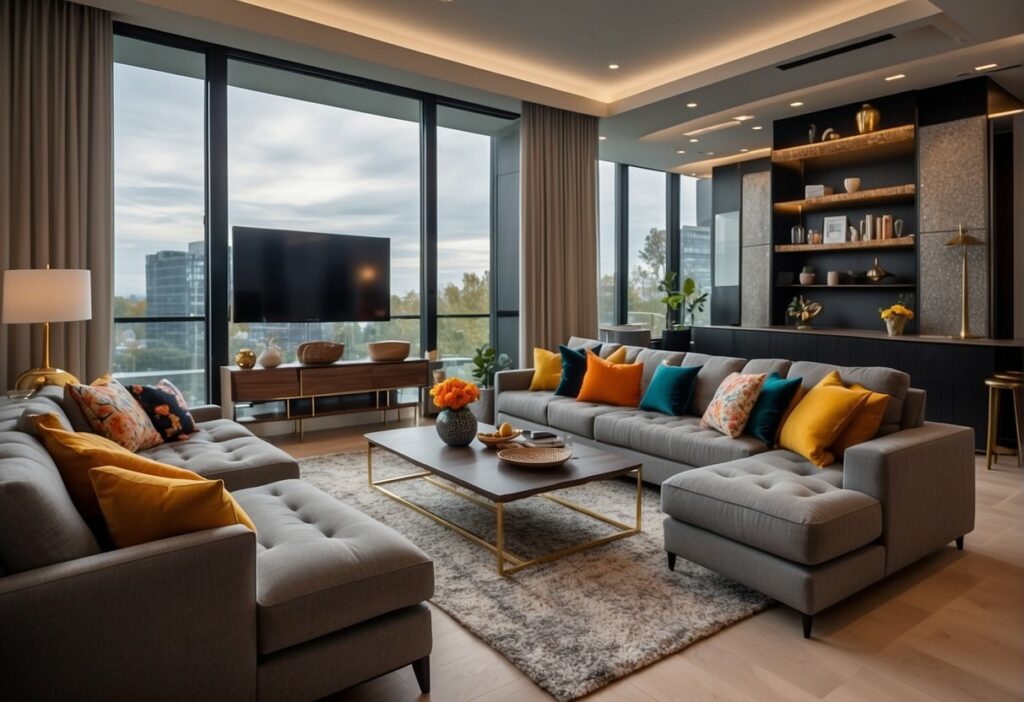Feng Shui Renovation: Transform Your Home’s Energy
Are you planning to renovate your home? Have you considered incorporating Feng Shui principles into your renovation project? Feng Shui is an ancient Chinese practice that focuses on creating harmony and balance in the environment around us. By applying Feng Shui principles to your renovation project, you can create a space that promotes positive energy flow and enhances overall well-being.

The fundamentals of Feng Shui in renovation involve understanding the five elements (water, wood, fire, earth, and metal) and how they interact with each other. Each element is associated with different colours, shapes, and materials, and by using them in the right way, you can create a harmonious and balanced space. For example, if you want to create a calm and peaceful environment, you may want to use the water element, which is associated with the colours blue and black, and is represented by wavy and flowing shapes.
Practical Feng Shui renovation tips include decluttering your home, incorporating natural light, and choosing the right colours and materials. By decluttering your home, you can create a more spacious and open environment, which promotes positive energy flow. Natural light is also important in Feng Shui, as it represents the energy of the sun and brings vitality and warmth into your home. When choosing colours and materials, it’s important to consider their associations with the five elements and choose ones that promote balance and harmony in your space.
Key Takeaways
- Feng Shui principles can be applied to your renovation project to create a harmonious and balanced space.
- Understanding the five elements and their associations with colours, shapes, and materials is fundamental to Feng Shui in renovation.
- Practical Feng Shui renovation tips include decluttering, incorporating natural light, and choosing the right colours and materials.
Fundamentals of Feng Shui in Renovation

Renovating your home can be an exciting time, but it’s important to consider the principles of Feng Shui to ensure that your home is balanced and harmonious. Here are some fundamentals of Feng Shui in renovation that you should keep in mind.
Understanding Chi and Energy Flow
In Feng Shui, chi refers to the energy flow in your home. It’s important to ensure that the chi flows smoothly throughout your home to promote well-being and prosperity. To achieve this, you should consider the layout of your home and ensure that there are no obstructions blocking the flow of chi. Natural light is also important, as it helps to promote positive energy flow.
The Five Elements and Home Design
The five elements in Feng Shui are wood, fire, earth, metal, and water. Each element has its own unique characteristics and can be used to create balance and harmony in your home. When designing your home, consider incorporating natural elements such as wood and stone to promote calm and growth.
Applying the Bagua Map
The Bagua Map is a tool used in Feng Shui to map out the energy flow in your home. It’s divided into nine sections, each of which corresponds to a different aspect of your life, such as wealth, health, and relationships. By using the Bagua Map, you can identify areas of your home that may need attention and make changes to promote positive energy flow.
Colour and Material Selection
Colour and material selection are important in Feng Shui, as they can have a significant impact on the energy flow in your home. When selecting colours, consider the elements they represent. For example, green represents the wood element and is associated with growth and vitality. When selecting materials, consider natural materials such as wood and stone, which can help to promote calm and balance.
Furniture and Accessory Placement
The placement of furniture and accessories is also important in Feng Shui. When placing furniture, consider the commanding position, which is the position that allows you to see the entrance to the room. This position is associated with power and control and can help to promote positive energy flow. When placing accessories such as mirrors, consider their placement carefully, as they can reflect and amplify energy in your home.
By keeping these fundamentals of Feng Shui in mind, you can create a home that is balanced, harmonious, and promotes well-being and prosperity.
Practical Feng Shui Renovation Tips

If you’re planning to renovate your home and incorporate Feng Shui principles, here are some practical tips to help you achieve balance, harmony, and positive energy in your living spaces.
Maximising Natural Light and Space
One of the essential elements of Feng Shui is natural light. So, when renovating, consider maximising natural light and space in your home. You can achieve this by adding more windows, skylights, or even a sunroom. Natural light is not only good for your health and well-being, but it also helps to create a spacious and harmonious environment.
Creating a Clutter-Free and Harmonious Environment
Decluttering is one of the most important steps in Feng Shui. It helps to create a clutter-free and harmonious environment that promotes positive energy and tranquillity. So, before you start renovating, take the time to declutter your home, especially your bedroom, kitchen, and bathroom. You can also consider adding storage solutions to keep your space organised and clutter-free.
Incorporating Feng Shui in Key Rooms
When renovating, it’s essential to incorporate Feng Shui principles in key rooms such as your bedroom, kitchen, and bathroom. For example, in your bedroom, position your bed in a way that allows you to see the door without being directly in line with it. In your kitchen, keep your stove away from the sink and make sure that it’s not facing the door. And in your bathroom, keep the toilet lid down and make sure that it’s not directly facing the door.
Choosing the Right Renovation Partners
Choosing the right contractor or renovation partner is crucial when incorporating Feng Shui principles in your home. You need to find someone you can trust and who understands the importance of quality workmanship and attention to detail. Before you start renovating, do your research and ask for recommendations from friends and family. Remember, a good renovation partner can help you achieve the balance, harmony, and positive energy you’re looking for in your living spaces.
Frequently Asked Questions

What are the most auspicious dates for starting a house renovation according to Feng Shui?
According to Feng Shui, the most auspicious dates for starting a house renovation are determined by the Chinese Almanac, also known as the Tong Shu. This ancient calendar system takes into account the lunar cycles and the positions of the stars to determine the most favourable dates for various activities, including house renovations. It is believed that starting a renovation on an auspicious date can bring good luck and positive energy to the home.
How can one integrate Feng Shui principles into interior design during a renovation?
Integrating Feng Shui principles into interior design during a renovation involves creating a harmonious balance of energy in the home. This can be achieved by considering the placement of furniture, colours, lighting, and other design elements. For example, in Feng Shui, the placement of the bed is important as it can affect the quality of sleep. It is recommended to place the bed in a commanding position, where it has a clear view of the door but is not directly in line with it.
What rituals should be performed before commencing a renovation to ensure good Feng Shui?
Before commencing a renovation, it is recommended to perform a space clearing ritual to remove any negative energy from the home. This can be done by burning sage or smudging with incense, and walking through each room while focusing on positive intentions. It is also important to declutter the space and remove any items that no longer serve a purpose.
Is it considered favourable to renovate during the Chinese New Year period?
Renovating during the Chinese New Year period is generally not recommended in Feng Shui as it is considered to be a time of transition and change. It is believed that renovating during this time can disrupt the flow of energy in the home and bring bad luck. It is best to wait until after the Chinese New Year period to commence any major renovations.
What Feng Shui considerations are important when planning the layout during a renovation?
When planning the layout during a renovation, it is important to consider the flow of energy, or Qi, in the home. This can be achieved by creating open spaces that allow for the easy movement of energy throughout the home. It is also important to avoid sharp corners and angles, as these can create negative energy. Additionally, it is recommended to incorporate natural elements, such as plants or water features, to enhance the flow of positive energy in the home.
How does rolling a pineapple into a new house affect Feng Shui, and should this be done pre- or post-renovation?
Rolling a pineapple into a new house is a traditional Feng Shui practice that is believed to bring good luck and prosperity to the home. It is recommended to do this after the renovation is complete, as it is believed to symbolize the arrival of good fortune and abundance. However, it is important to note that this practice should not be relied upon as the sole means of achieving good Feng Shui, and should be used in conjunction with other Feng Shui principles.



